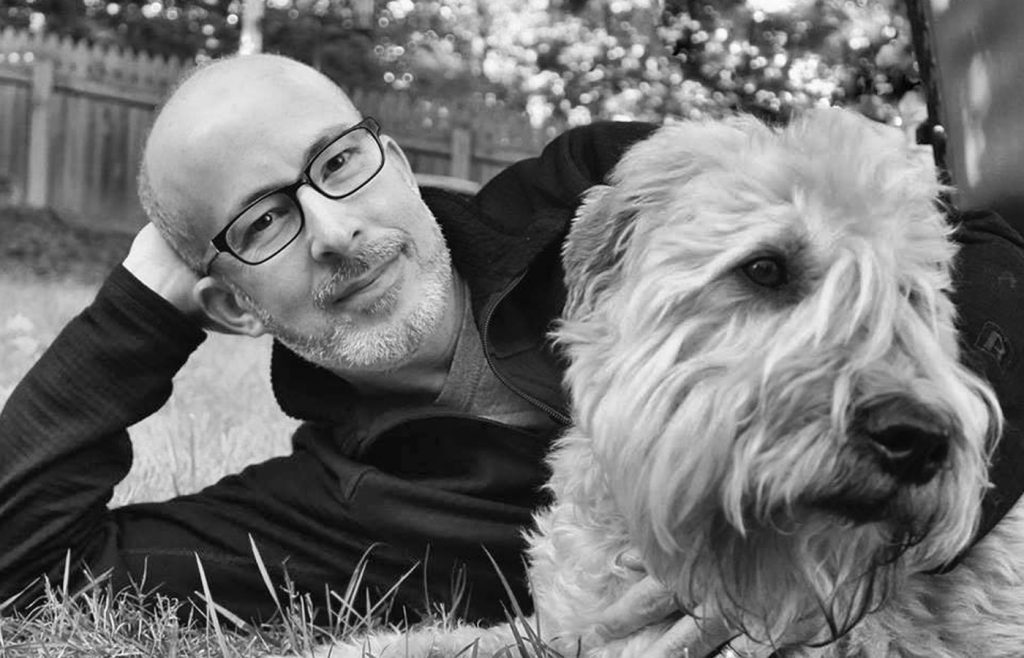
Gary J. Whitehead’s fourth book of poetry, Strange What Rises, was just published by Terrapin Books. His previous collection, A Glossary of Chickens, was chosen for the Princeton Series of Contemporary Poets and published in 2013 by Princeton University Press.
His work has been featured on Poetry Daily, Verse Daily, The Guardian’s Poem of the Week, the BBC’s Words and Music program, and American Life in Poetry. Awards for his poetry include the Anne Halley Prize from The Massachusetts Review, a New York Foundation for the Arts Fellowship, and the Pearl Hogrefe Fellowship at Iowa State University. During his time in Iowa, Whitehead lived in Ames, Eldora, and New Providence, and he served as Poetry Editor of Flyway.
The Weight
Heavier than I would have thought,
heavier than a sack of flour,
than a bag of Vidalias or, better yet,
a meshed bunch of oranges,
she smelled vaguely of baby powder
and milky spit. Yes, she was heavy,
and my arms, after five minutes,
hurt, but I held her anyway,
heavy as she was,
and Laurance, her mother,
said I had a way though I didn’t
think I did and still don’t. And now
I can’t remember the baby’s name
or how I came to be staying
at that lake house in the first place,
or why I might have taken
that child in my arms, that weight,
that gummy, smiling face
and those chubby, kicking legs.
But I remember she was heavy
and that I was glad to pass her back,
sweet as she was but that
I couldn’t stop staring
into those tiny, gray eyes,
which seemed to see
something in me
once there was nothing left
to hold but my aching.
Parting Ways
All at once you’re out of love again,
and it’s like the earth has jerked on its axis,
and the screen door slaps shut behind you,
and you cross a meadow and enter
the woods, one branch swinging like the door
to a saloon, and soon you’re in a clearing
where a hunter crouches over a body
you smelled long before you got there.
A suicide, he says, and there’s a note.
The skin yellow, preserved by some concoction—
antifreeze and orange juice—so the buzzards
and bears, the foxes and coyotes and coons
would eschew it. The bottle still in his hand.
The eyes like those tiny, translucent onions
you find at the bottom of a jar of pickles.
But what sickens the most is a week later
the hunter’s dating the dead guy’s ex,
and you clink bottles at the bar when he tells of it.
Cleromancy
In laps, on stoops, in plots of dust,
with stones, with sticks, with chunks of dung,
they cast their lots and found
in what was flung the means
they needed. One lot for the Lord,
one for the goat with the spotted head.
Let loose in a wilderness, it heard
the wind of its brother’s bloodlet end,
paused, and rolled its cud. With cuds,
with knuckles, with gems (the Urim
and Thummim), yes, with whatever
instruments God gave them,
as long as volition, in its division,
dropped from cupped hands and left them
blameless as eggless nests.
With eggs, with wood, with pebbles,
on tables, in fields, on decks of ships,
they cast their lots, wanting what I want—
to decide without deciding,
to find some guidance, to take up,
like divided garments, the will
of God and try it on for size.
The dice I roll, the coin I flip,
the thoughts that drop in my mind
like twigs and which I analyze.
Life choices I hold in my hand,
lengths hidden by the fist of fate.
Child I never had—O Jonah
thrown over! Equivocal calm.
In scrimshaw I might have carved out
your life had I not strewn the shards,
the little bones, the dried beans,
had I been a better shepherd.
